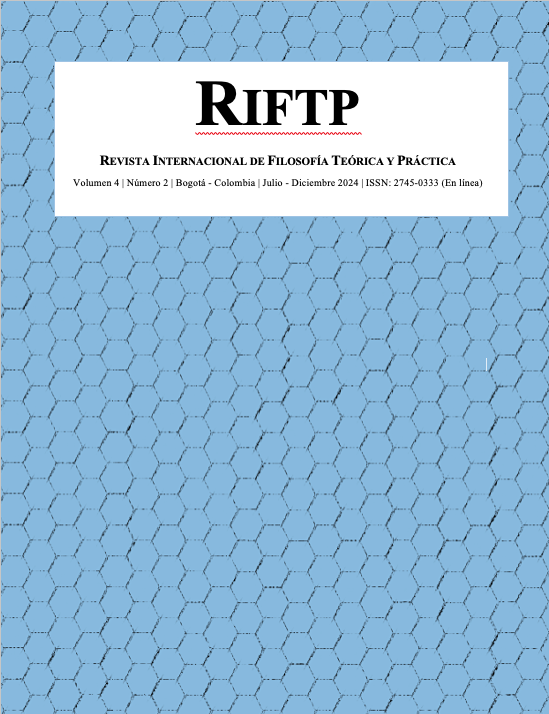Caso de las primeras bebés perfeccionadas genéticamente: análisis desde los principales planteamientos éticos transhumanistas y la filosofía de Levinas
DOI:
https://doi.org/10.51660/riftp.v4i2.180Keywords:
perfeccionamiento, transhumanismo, bioética, genética, Levinas, filosofíaAbstract
Con el anuncio en 2018 del nacimiento en China de las primeras bebes perfeccionadas genéticamente para que el VIH no pudiera afectarlas, también reapareció, de forma renovada, el debate académico sobre la propuesta transhumanista del mejoramiento humano. En el presente artículo nos planteamos, mediante el análisis de fuentes escritas y audiovisuales, exponer las principales posturas éticas transhumanistas, a favor y en contra del perfeccionamiento llevado a cabo, para posteriormente incluir en la discusión algunas nociones de la filosofía de Emmanuel Levinas que pueden enriquecer el debate. Este análisis nos permitirá no sólo profundizar en este caso y definir las posturas éticas transhumanistas, sino ofrecer algunos argumentos levinasianos que pueden expresar alguna oposición, enriqueciendo así el debate a nivel no sólo filosófico y ético, sino bioético.
Downloads
References
Ahmed, T. (2022). Científicos logran secuenciar el genoma humano completo por primera vez. CNN. https://cnnespanol.cnn.com/2022/03/31/secuenciar-genoma-humano-completo-trax/
Alayón, D. (2018). Chinese scientist claims to have created "world's first genetically-modified babies". Medium. https://medium.com/future-today/chinese-scientist-claims-to-have-created-worlds-first-genetically-edited-babies-e5c5842eda1
Bayer Global. (2022). ¿Qué es la tecnología CRISPR? Ciencia. https://www.bayer.com/es/es/blog/espana-que-es-la-tecnologia-crispr
Bergson, H. (1963). La evolución creadora (Primera ed., J. A. Miguez, Trad.). Madrid: Aguilar.
Cohen, J. (2018). Science. https://doi.org/10.1126/science.aaw2120
Fischer, A. (2023). He Jiankui: el científico que creó bebés modificados genéticamente vuelve a la ciencia tras estar encarcelado. National Geographic en español. https://www.ngenespanol.com/ciencia/he-jiankui-como-crear-bebes-modificados-geneticamente/
Gómez-Sellés Gárate, J. (2019). Nacimiento de los dos primeros bebés modificados genéticamente. Análisis del tratamiento de la noticia en España desde el punto de vista de la comunicación de la ciencia. Artefactos. Revista de estudios de la ciencia y la tecnología, 8(2), 53-71.
Huxley, T. H., & Huxley, J. S. (1947). Evolution and ethics. London: The Pilot Press LTD.
Jiankui, H. (2018). Draft Ethical Principles of Therapeutic Assisted Reproductive Technologies. https://www.youtube.com/watch?v=MyNHpMoPkIg
Jiankui, H. (2018). The He lab. https://www.youtube.com/@thehelab4617
Kass, L. R. (1971). Babies and means of in vitro fertilization: Unethical experiments on the unborn? New England Journal of Medicine, 285, 1174-1179.
Kolata, G., & Belluck, P. (2018). ¿Por qué los científicos están tan molestos con los primeros bebés Crispr? The New York Times en Español. https://www.nytimes.com/es/2018/12/07/espanol/primeros-bebes-geneticamente-editados.html
Levinas, E. (1930). Théorie de l’intuition dans la phénoménologie de Husserl. Paris: Librairie Philosophique J. Vrin
Levinas, E. (1937). Arts techniques et pratiques religieuses. Les Cahiers de Radio-París, (5), 518-521.
Levinas, E. (1946). Il y a. Deucalion, (1), 142-154.
Levinas, E. (1984). Diálogo. En R. Scherer, Fe cristiana y sociedad moderna (D. Tolsada, Trad., Vol. 1, pp. 75-97). Madrid: S.M.
Levinas, E. (1989). Etica come filosofia prima. En E. Levinas, A. Peperzak, & F. Ciaramelli (Eds.), Etica come filosofia prima (F. Ciaramelli, Trad., pp. 47-59). Napoli: Guerini e Associati.
Levinas, E. (2000). De la existencia al existente (P. Peñalver, Trad.). Madrid: Arena Libros.
Levinas, E. (2002). Totalidad e Infinito. Ensayo sobre la exterioridad (D. E. Guillot, Trad.). Salamanca, España: Sígueme.
Levinas, E. (2004). La teoría fenomenológica de la intuición (T. Checchi, Trad.). Salamanca, España: Ediciones Sígueme.
Marchione, M. (2018). Un investigador chino afirma haber editado genéticamente los primeros bebés. Associated Press News. https://apnews.com/article/ap-top-news-international-news-ca-state-wire-genetic-frontiers-health-4997bb7aa36c45449b488e19ac83e86d
Marx, V. (2021). The CRISPR children. Nature Biotechnology, 39, 1486-1490. https://doi.org/10.1038/s41587-021-01138-5
Montoliu, L. (2019a). Prisión, multa e inhabilitación de por vida. Genética. https://montoliu.naukas.com/2019/12/31/prision-multa-e-inhabilitacion-de-por-vida/
Montoliu, L. (2019b). Nuevos datos sobre las gemelas chinas editadas genéticamente confirman que el experimento fue tan irresponsable como parecía desde el primer día. Genética. https://montoliu.naukas.com/2019/12/08/nuevos-datos-sobre-las-gemelas-chinas-editadas-geneticamente-confirman-que-el-experimento-fue-tan-irresponsable-como-parecia-desde-el-primer-dia/
NASEM. The National Academies of Sciences, Engineering, and Medicine provide nonpartisan, objective guidance for decision makers on pressing issues. (2018). Second International Summit on Human Genome Editing: Continuing the Global Discussion. Vimeo Livestream. https://livestream.com/accounts/7036396/events/8464254/videos/184103056
National Academies of Sciences, Engineering, and Medicine. (2019). Second International Summit on Human Genome Editing: Continuing the Global Discussion: Proceedings of a Workshop in Brief. Washington, DC: The National Academies Press
National Human Genome Research Institute (NHGRI). (2024). Glosario parlante de términos genómicos y genéticos. Línea germinal. https://www.genome.gov/es/genetics-glossary/Linea-germinal
Observatorio de Bioética UCV. (2016). Edición genética. Se modifican embriones humanos por segunda vez. Observatorio de Bioética UCV. https://www.observatoriobioetica.org/2016/04/edicion-genetica-modifican-embriones/13309
Ramsey, P. (1972). Shall we "reproduce"? I. The medical ethics of In vitro fertilization. Journal of the American Medical Association, JAMA.
Ratner, P. (2019). Read a Harvard geneticist’s plan for redesigning humans. Big think. https://bigthink.com/health/harvard-geneticist-plan-for-redesigning-humans/
Regalado, A. (2018). Exclusive: Chinese scientists are creating CRISPR babies. MIT
Technology Review. https://www.technologyreview.com/s/612458/exclusive-chinese-scientists-are-creating-crispr-babies/
Savulescu, J. (2018). The Fundamental Ethical Flaw in Jiankui He’s Alleged Gene Editing Experiment. Practical Ethics. https://blog.practicalethics.ox.ac.uk/2018/11/the-fundamental-ethical-flaw-in-jiankui-hes-alleged-gene-editing-experiment/
Savulescu, J. (2019). Press statement: He Jiankui. Blog Practical Ethics. http://blog.practicalethics.ox.ac.uk/2019/01/press-statement-he-jiankui/
Savulescu, J., & Hope, T. (2010). The ethics of research. En P. Adamson, R. Audi, T. Baldwin, C. Bennett, S. Blackburn, A. Brennan, M. Clayton, & J. Skorupski (Eds.), The Routledge Companion to Ethics (pp. 781-795). Abingdon, Canada: Routledge.
Savulescu, J., & Singer, P. (2019). An ethical pathway for gene editing. Bioethics, 33, 221-222. https://doi.org/10.1111/bioe.12570
Schaefer, O. (2018). Rogue science strikes again: The case of the first gene-edited babies. The Conversation. https://theconversation.com/rogue-science-strikes-again-the-case-of-the-first-gene-edited-babies-107684
Wang, T., Antonacci-Fulton, L., Howe, K., Lawson, H. A., Lucas, J. K., Phillippy, A. M., & Garrison, E. P. (2022). Human Pangenome Reference Consortium. The Human Pangenome Project: A global resource to map genomic diversity. Nature, 7906(604), 437-446.
Published
Issue
Section
License
Copyright (c) 2024 Revista Internacional de Filosofía Teórica y Práctica

This work is licensed under a Creative Commons Attribution-NonCommercial-ShareAlike 4.0 International License.
Articles are published under the terms of a licence that permits use, distribution and reproduction in any medium, provided that the original work is properly cited. Ed&TIC retains the proprietary rights to the published works and actively promotes the reuse of these works under the terms of the aforementioned licence, which encourages the dissemination of knowledge and collaboration in the academic community.


